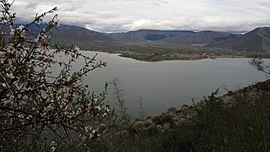Mavrochori
Village in Macedonia, Greece From Wikipedia, the free encyclopedia
Village in Macedonia, Greece From Wikipedia, the free encyclopedia
Mavrochori (Greek: Μαυροχώρι(οv), meaning "black village"; before 1928: Μαύροβον – Mavrovon)[2] is a village on the shores of Lake Orestiada in Kastoria regional unit of Macedonia, Greece.[3]
Mavrochori | |
|---|---|
 Mavrochori (left), Polykarpi (right) | |
| Coordinates: 40°30′44″N 21°19′13″E | |
| Country | Greece |
| Geographic region | Macedonia |
| Administrative region | Western Macedonia |
| Regional unit | Kastoria |
| Municipality | Kastoria |
| Municipal unit | Makednoi |
| Population (2021)[1] | |
| • Community | 1,379 |
| Time zone | UTC+2 (EET) |
| • Summer (DST) | UTC+3 (EEST) |
Today Mavrochori is a tourist destination for a quiet vacation near the lake of Kastoria.[4] In addition to the trade fair, festive events take place on the 13th - 15 August of the Assumption of Mary, where the Monastery of Panagia Mavriotissa celebrates (it was built by General George Palaiologos in commemoration of the victory against the Normans in 1083).[5] The Mavrochori Nautical Club also operates in the village.[6]
It was in existence at least from 1380[5] and is denoted, under the name Mavrobo, in the British Baldwin & Craddock Map of Greece which was published on 1 January 1830.[7] The name Mavros, together with the name Krepeni, is found in a title deed executed by Serbian nobleman Nikola Bagaš.[8]
In the end of the 18th century the patriarch of the Mavrovitis family moved his people from the nearby Krepeni village to Mavrovo in order to avoid a plague pandemic, and it is believed that people were frequently moving between Krepeni and Mavrovo.[5]
The Monastery of Panagia Mavriotissa, originally named Mesonisiotissa (meaning "in the middle of the island"), was built near the village.[5]
Mavrochori had a historical relationship with both the Mavriotissa monastery as well as with the nearby village of Krepeni.[5]
During Ottoman rule, Mavrovo was populated by Christians and Muslims, it had one Greek school and one Muslim school and five inns.[9] The 1920 Greek census recorded 1,062 people in the village, and 450 inhabitants (45 families) were Muslim in 1923.[10] Following the Greek–Turkish population exchange, Greek refugee families in Mavrovo were from Asia Minor (55), Pontus (19) and one other from an unidentified location in 1926.[10] The 1928 Greek census recorded 1,065 village inhabitants.[10] In 1928, the refugee families numbered 72 (320 people).[10] There were two mosques and two Muslim cemeteries in the village, later all destroyed.[11]
Seamless Wikipedia browsing. On steroids.
Every time you click a link to Wikipedia, Wiktionary or Wikiquote in your browser's search results, it will show the modern Wikiwand interface.
Wikiwand extension is a five stars, simple, with minimum permission required to keep your browsing private, safe and transparent.